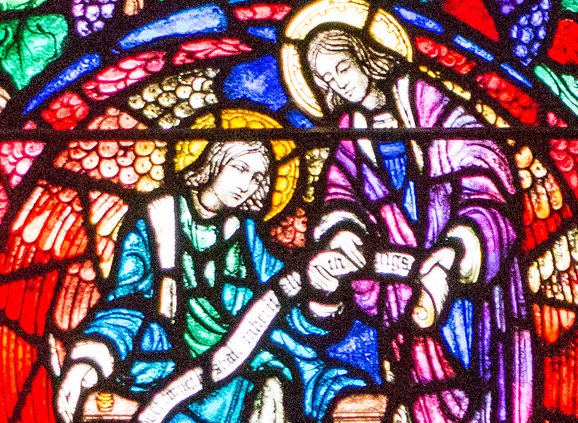
- Education Forums
Bible Study Guide for Sunday, November 21, 2021

- 2 Samuel 23:1-7
- Psalm 132:1-13(14-19)
- Revelation 1:4b-8
- John 18:33-37
Today’s Feast of Christ the King can be difficult for many of us. As Americans we tend to have an ingrained distrust of authority and our national identity is rooted explicitly in rejecting kings. Proclaiming Christ as King can sound much too patriarchal and hierarchical for our tastes. Some Christian traditions call today “Reign of Christ Sunday” so it at least sounds less male. Mujerista theologian Ada Maria Isasi-Diaz frequently referred to “the kin-dom of God” rather than the “kingdom of God” in order to emphasize the fundamental differences between the rule of Christ and the oppressive human authority structures that we know all too well.*
The Feast of Christ the King is one of the newer feast days on the Christian calendar. Pope Pius IX first established this feast day in 1925, and much of the western Christian church adopted it over the course of the 20th century. In a time when much of the world was devastated after World War I, fascist movements were building steam throughout Europe and the Ku Klux Klan was leading 35,000 people to march on Washington DC, the Feast of Christ the King proclaimed that all of these human political movements are fleeting and our ultimate allegiance is always to Christ. Human authorities vary between “benevolent but still deeply flawed” to “outright evil” and Jesus is our one true good ruler. The brutality and devastation of our world can find its healing in the reign of Christ our good King.
Our readings today show how complicated this concept is. David, who is described as “The favorite of the Strong One of Israel” saw his kingdom torn apart by civil wars and the kingdom would split into two after the death of David’s son Solomon. Even the best of Israel’s human kings are not so great. And still David’s last words look forward to a good and true king who will eventually be born to David’s family line. That promise is fulfilled in Jesus, but Jesus still takes care to distinguish his kingdom from any earthly institution. Jesus, the true and good King, still dies under the orders of the Roman governor Pontius Pilate. Jesus’ kingdom is not of this world.
And yet we still live in this world, with our ultimate allegiance to Christ as King but living in a world with human authorities who range from “flawed” to “terrible.” We won’t escape these human authority structures until Jesus comes again in his glory, but as Christians our deepest and most lasting obedience is always to Christ as our king. Regardless of whatever kingdoms we find ourselves living in, Jesus invites us to live into the Kingdom of God which is marked by wholeness, justice, and generosity. Jesus “who loves us and freed us from our sins by his blood [has] made us to be a kingdom.”
– Kristen Filipic
How do you react to the phrase “Christ the King”? Are other expressions such as “Reign of Christ” or “kin-dom of God” more illuminating for you?
What are some ways where you find a conflict between living in the ultimate Kingdom of God while surrounded by our earthly kingdoms?How do you find your way through these conflicts?
What are some concrete ways in which Jesus may be inviting you to live more fully into the Kingdom of God
* Dr. Isasi-Diaz introduced the term “kin-dom of God” to the general public but says she first heard it from a friend of hers, Sister Georgene Wilson, OSF.
- January 2024
- December 2023
- November 2023
- October 2023
- September 2023
- June 2023
- May 2023
- April 2023
- March 2023
- February 2023
- January 2023
- December 2022
- November 2022
- October 2022
- June 2022
- May 2022
- April 2022
- March 2022
- February 2022
- January 2022
- November 2021
- October 2021
- September 2021
- August 2021
- July 2021
- June 2021
- May 2021
- April 2021
- March 2021
- February 2021
- January 2021
- December 2020
- November 2020
- October 2020
- September 2020
- August 2020
- July 2020
- March 2020
- February 2020
- January 2020
- December 2019
- November 2019
- October 2019
- September 2019
- August 2019
- July 2019
- June 2019
- May 2019
- April 2019
- March 2019
- February 2019
- January 2019
- December 2018
- November 2018
- October 2018
- September 2018
- August 2018
- July 2018
- June 2018
- May 2018
- April 2018
- March 2018
- February 2018
- January 2018
- December 2017
- November 2017
- October 2017
- September 2017
- July 2017
- May 2017
- April 2017
- March 2017
- February 2017
- January 2017
- December 2016
- November 2016
- October 2016
- September 2016
- August 2016
- May 2016
- April 2016
- March 2016
- February 2016
- January 2016
- December 2015
- November 2015
- October 2015
- October 2013
- September 2013
At "Educational Forums," enrich your spiritual journey by exploring our resources including videos of lectures, essays by priests, and other pieces about our faith, our church, and what it means to be a disciple of Jesus in the 21st century.


Comments